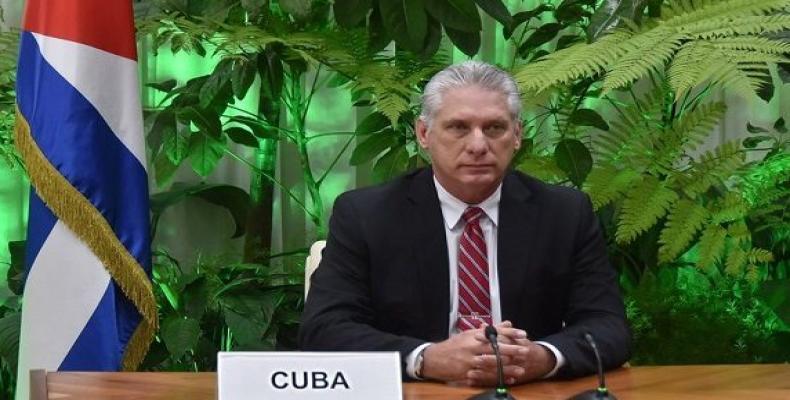Havana, July 8 (RHC)-- The president of the Republic of Cuba, Miguel Díaz-Canel, spoke on Wednesday at the World Leaders' Day of the International Labor Organization (ILO) Summit on COVID-19 and the World of Work -- which is being held virtually with the participation of heads of state and government, and prominent global employer and trade union leaders.
Labor measures adopted in Cuba before COVID-19
In Cuba, in order to prevent and confront COVID-19, various measures were adopted, ranging from the policy of protecting the health of all the people, fiscal policies, maintenance of employment, and social protection for all, among others.
Thirty-six measures were implemented in the areas of labor, wages and social security, distance working and teleworking were encouraged, workers were relocated to other jobs, and wage guarantees were extended to workers who are at home caring for minor children, older adults and people in fragile health conditions or who could not be relocated.
More than 240,000 workers in the non-state sector were exempted from paying taxes, pensions were maintained, and social workers provided special attention to families in need.
The protection measures were more extensive than those previously established by law, for workers in both the state and non-state sectors. Those who fell ill were paid benefits and those who were placed in preventive isolation due to illness also received protection. In all cases, workers maintained their working relationship with the entity.
All the protection measures adopted are more extensive than those previously established by law. No one was or will be left unprotected.
Data:
Total workers in the state sector - 2 million 855 thousand 754
Relocated workers- 48,343.
Interrupted workers - 146,507, protected by a wage guarantee - 77,180.
Mothers with children in primary education - 78,301
Mothers with children in children's circles - 10,955
Workers in isolation, ordered by health authorities - 8,776
Older adults (over 60 and under that age but in fragile health) - 71,409
Self-employed workers - Total - 613,921, benefiting from temporary suspension - 243,308. This implies certain benefits such as tax exemption, deferment of social security contributions, among others.
Cuba, the ILO and workers' rights
Cuba feels legitimate pride and satisfaction in being a founding country of this International Labor Organization. The country's commitment to the ILO and workers' rights has remained unchanged. As an example of this, our country is a State party to the eight Fundamental Conventions of the Organization.
The objective of building an increasingly sovereign, independent, socialist, democratic, prosperous and sustainable nation, on the basis of which we have continued to perfect the Cuban model of economic and social development, includes strengthening the promotion and protection of workers' rights and trade union freedoms.
The new Magna Carta of the Republic, among other advances in the economic and social sphere, further strengthened the recognition and legal protection of the rights of all workers, including those in the non-State sector of the economy.
It recognizes the right to work and to obtain decent employment; enshrines that all persons, without discrimination, receive equal pay for equal work; and prohibits the work of children and adolescents.
It also recognizes and protects the right of workers to rest, an eight-hour working day, weekly rest and paid annual leave, and to social security when a person is unable to work because of age, maternity, paternity, disability or illness.
At the same time, it enshrines the responsibility of the State to guarantee the right to occupational safety and health; and to organize institutions and services that support working families.
In turn, the Labor Code, adopted in 2013, ratified the protection of trade union freedoms, including the freedom to associate voluntarily and to form trade union organizations.
In Cuba, trade union work is essential for the realization of workers' rights, and for the achievement of the economic and social goals that we have set for ourselves as a nation.
The trade union organizations that the Central de Trabajadores de Cuba -- the Confederation of Cuban Workers -- brings together are autonomous. Its members approve their own statutes and regulations, discuss and reach agreements democratically and elect or revoke their directors.
They carry out their work without interference from the authorities and their leaders have the necessary guarantees for the exercise of their management. More than 90% of Cuban workers are unionized. They are beneficiaries of social, participatory and democratic dialogue. Collective bargaining is a reality in Cuba.
In our country, we have continued to implement policies that favor full employment, encourage the incorporation of young people into the workplace, protect women and working families, and strengthen social security and assistance.
We have continued to promote access to work without exclusion or discrimination for persons with disabilities, taking into account their choice, their level of training and the demands of the economy.
We show relevant results in terms of women's access to employment. Women, who constitute the majority of the workforce in various sectors, enjoy equal rights with men, including in the field of work. They receive equal pay for work of equal value; and the maternity of working women is protected, with specific rules and policies.
We have continued to make progress in the area of the right to equality, which in the field of labour has been expressed in greater guarantees for non-discrimination on grounds harmful to human dignity.


